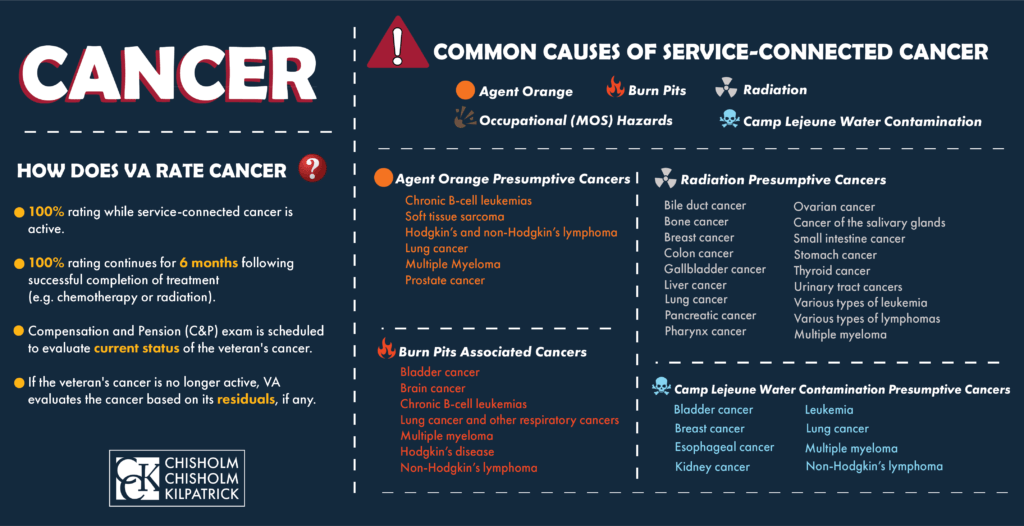VA Disability Ratings for Respiratory Cancers

On August 10, 2022, the Honoring Our Promise to Address Comprehensive Toxics (PACT) Act of 2021 added 23 conditions to the Department of Veterans Affairs’ presumptive list for military toxic exposure. Among these conditions are respiratory cancers. The PACT Act also expanded VA’s presumptions of exposure for Agent Orange-related respiratory cancers.
What Are Respiratory Cancers?
Generally, cancer is the uncontrolled growth of abnormal cells in the body. Respiratory cancers are cancers that originate in the respiratory system (i.e., the network of organs and tissues that help a person breathe.)
Respiratory cancers include:
- Lung cancer: Symptoms of lung cancer include a new cough or cough that does not go away, coughing up blood, shortness of breath, chest pain, and hoarseness.
- Cancer of the trachea: Symptoms of cancer of the trachea include dry cough, hoarseness, breathlessness, and difficulty swallowing.
- Cancer of the larynx: Symptoms of cancer of the larynx include hoarseness, voice changes, sore throat or earache, and feeling a lump in the throat.
- Cancer of the bronchus: Symptoms of cancer of the bronchus include cough, chest pain, coughing blood.
Lung cancer is the third most common cancer in the United States. Additionally, about 80 to 85 percent of all lung cancers are non-small cell lung cancer, or NSCLC. The main subtypes of NSCLC include adenocarcinoma, squamous cell carcinoma, and large cell carcinoma.
To diagnose respiratory cancers, doctors typically conduct imaging tests or biopsies to examine cell or tissue samples. Respiratory cancers are generally treated with surgery, chemotherapy, radiation therapy, or targeted therapy. A patient’s treatment depends on the location and stage of the cancer, as well as their age and general health.

Presumptive Service Connection for Respiratory Cancers
Veterans who were exposed to military toxic exposure or herbicide exposure (e.g., Agent Orange) and developed a respiratory cancer may qualify for VA disability compensation on a presumptive basis. Presumptive service connection is when VA presumes a veteran’s condition was caused by their military service, removing the nexus requirement.
It is important to note that VA only awards presumptive service connection for respiratory cancer if the respiratory cancer is the primary cancer (i.e., the original site where a cancer began).
PACT Act and Military Toxic Exposure Presumptions
As mentioned above, the PACT Act added 23 conditions to VA’s presumptive list for military toxic exposure, including respiratory cancer of any type.
Essentially, veterans who are considered “covered veterans” can qualify for presumptive service connection for any type of respiratory cancer. The bill defines covered veterans as the following:
- A veteran who, on or after August 2, 1990, performed active military, naval, air, or space service while assigned to a duty station in, including air space above:
- Bahrain
- Iraq
- Kuwait
- Oman
- Qatar
- Saudi Arabia
- Somalia
- United Arab Emirates
- A veteran who, on or after September 11, 2001, performed active military, naval, air, or space service, while assigned to a duty station, including the airspace above:
- Afghanistan
- Djibouti
- Egypt
- Jordan
- Lebanon
- Syria
To be eligible for this presumption, veterans simply must have evidence that they served in one of the qualifying locations during the qualifying periods and have a diagnosis of a respiratory cancer. This presumption also applies to surviving spouses of veterans seeking retroactive Dependency and Indemnity Compensation (DIC) benefits.
View the full list of toxic exposure presumptive conditions here.

PACT Act and Agent Orange Presumptions
Respiratory cancers are also considered presumptive conditions for veterans exposed to Agent Orange and other herbicides. VA acknowledges presumptive Agent Orange exposure for the following time periods and locations:
- January 9, 1962 to May 7, 1975 in Vietnam: Boots-on-the-ground in Vietnam, veterans with service aboard a ship that operated in the inland waterways of Vietnam (i.e., Brown Water veterans), or veterans with service aboard a ship in Vietnam’s territorial seas (i.e., Blue Water Navy veterans)
- September 1, 1967 to August 31, 1971 in the DMZ: On or near the Korean demilitarized zone (DMZ)
- 1969 to 1986, C-123 aircraft: Active duty and reservist personnel who had regular contact with C-123 aircraft
As of the authorization of the PACT Act, VA also expanded its presumptions related to Agent Orange exposure to include veterans with active military, naval, air, or space service in the following locations and time periods:
- January 9, 1962 to May 7, 1975 in the Republic of Vietnam
- January 9, 1962 to June 30 1976 in Thailand: At any US or Thai base without regard to the Veteran’s MOS or where on base they were located
- December 1, 1965 to September 30, 1969 in Laos
- April 16, 1969 to April 30, 1969 in Cambodia: Specifically at Mimot or Krek, Kampong Cham Province
- January 9, 1962 to July 30, 1980 in Guam, American Samoa, or in the territorial waters
- January 1, 1972 to September 30, 1977 at Johnson Atoll: Johnston Atoll or a ship that called at Johnston Atoll
To be eligible for this presumption, veterans simply must have evidence that they served in one of the qualifying Agent Orange locations during the qualifying periods and have a diagnosis of a respiratory cancer. Again, VA only awards presumptive service connection if the respiratory cancer is the primary cancer.
View the full list of Agent Orange presumptive conditions here.
Direct Service Connection for Respiratory Cancer
If you do not qualify for presumptive service connection for respiratory cancer, you must show evidence of the following three things to be eligible for VA disability benefits:
- An in-service event, injury, or illness;
- A current diagnosis by a medical professional;
- A medical nexus, or link, between the in-service event and current diagnosis.
When seeking service connection on a direct basis, it is important to demonstrate a connection between your military service and respiratory cancer. You can show evidence of this connection by securing a private nexus opinion from a medical professional and/or by submitting lay evidence. Lay evidence, or lay statements, can be written by you or anyone who knows you and can speak to your condition.
VA may also schedule you for a Compensation and Pension (C&P) exam to determine if a connection exists.
VA Disability Ratings for Respiratory Cancers
When respiratory cancers are malignant, or active, they are generally rated under 38 CFR § 4.97, Schedule of ratings – Respiratory System, using Diagnostic Code 6819. VA automatically assigns a 100 percent disability rating to veterans with a service-connected active cancer, including any type of respiratory cancer. This rating continues for as long as the cancer is active, and then for another six months following the successful completion of a treatment program, such as chemotherapy, radiation, or surgery.
VA will then schedule a C&P examination to reevaluate the status of the respiratory cancer. If the exam shows that the veteran’s cancer is in remission, VA will assign a disability rating based on its residuals. For example, a common residual of respiratory cancer is restrictive lung disease. If a veteran develops this, they will be rated using the General Rating Formula for Restrictive Lung Disease.
Other common residuals of respiratory cancers include:
- Anxiety
- Depression
- Sleeplessness
- Panic Attacks
- Scars
- Shortness of breath
- Impaired lung function

Was Your VA Disability Claim Denied?
If VA denied you service connection for respiratory cancer, Chisholm Chisholm & Kilpatrick LTD may be able to help. The accredited attorneys and claims agents at CCK have decades of experience assisting veterans in obtaining their rightfully earned benefits, and we can put our resources to work for you.
Call CCK today at 800-544-9144 to schedule a free consultation.
About the Author
Share this Post
